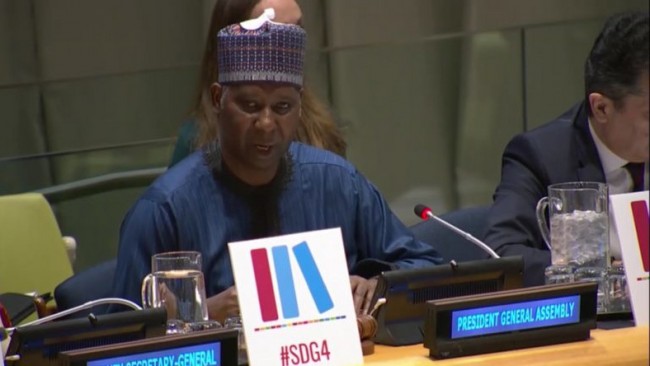Education in serious crisis, say stakeholders at UN
News Agency Of Nigeria
Pulse Nigeria
Senior United Nations officials and other stakeholders on Friday in New York raised concerns about the “alarming crisis’’ in the educational sector with a call on governments to act fast.

Speaking at a high-level interactive dialogue on education at the UN headquarters, they noted that the Sustainable Development Goals (SDGs) could not be achieved without inclusive and qualitative education.
The meeting was hosted by Nigeria to commemorate the 2020 International Day of Education with the theme, “Aligning Inclusive Quality Education Policies with Sustainable Development Goals’’.
According to the United Nations Education Fund (UNICEF), 258 million children and youth are currently out of school, while 617 million children and adolescents cannot read and do basic Mathematics.
Millions of refugees, internally displaced persons and people with disabilities are out also of school, according to the agency.
President of the UN General Assembly, Amb. Tijani Muhammad-Bande, said the statistics cast a shadow on the achievements so far recorded in the educational sector.
Muhammad-Bande said while the world had seen an increase in school enrollment and literacy rates within and across countries, the gaps were alarming and unacceptable.
“This is a blight on the progress we have made and governments around the world would have to pay more attention and engender needed partnerships to ensure access to free and quality primary and secondary education.
“It is in drawing attention of governments and other stakeholders in the education sector to the need to act now, that a platform such as this is important.
“We are bringing together government representatives, policymakers as well as thought and opinion leaders to identify gaps and proffer answers to burning issues in education’’ he said.
UN Deputy Secretary-General, Ms Amina Mohammed, expressed similar sentiments, noting that the SDGs could not be attained in the current situation.
“ The situation in education is alarming, alarming because of the crisis in the number of children, young people and adults who are not in education.
“It is alarming also because of the number of children, young people and adults who are in education but not learning.
“What is even more alarming is that young people with disabilities face additional challenges that are still yet to be addressed, and so do refugees and migrants,’’ Mohammed noted.
She said the International Day of Education must serve as a wakeup call to all stakeholders to step up efforts to make qualitative education accessible to all.
The Deputy Director-General of UNESCO, Amb. Xing Qu, attributed the problem to inadequate learning materials, lack of trained teachers and absence of appropriate infrastructures in schools, among others.
“All these challenges are linked, and that is why the SDGs must not be considered individually.
“The goal of zero hunger is linked to the goal of education for all because how can a child learn without food in his or her stomach?’’ he said
He canvassed support for the education development agenda of the 74th session of the General Assembly, noting that “education is the best investment we can make for our future’’.
For his part, the General Secretary of Education International, Dr David Edwards, decried the dearth of professional teachers in many regions and countries of the world.
Be blamed the situation on several factors including poor remuneration and lack of coherent teacher and labour policies.
“We need policy coherence across teacher development, we need good labour policy, which is key to good education policy.
“We need to be able to balance the short, medium and also be building towards the long terms.
“We can’t just keep bringing in volunteer teachers, because teaching is not a charity work but professional, and we need to treat it as such.
“We need dialogue with teachers because it is the people on the ground that actually know what is best and what they need.
“They can design their own professional development. They should have a voice in all of this,’’ he said.
NAN reports that the event featured two panel discussions by educational experts, policy makers and other stakeholders.
